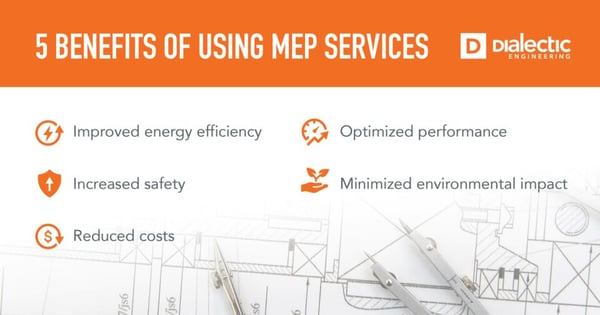
Buildings are full of complex systems that make it possible for us to use them every day. These systems provide power, light, heating/cooling and ventilation in a structure. Builders and engineers that work on these systems refer to them as MEP. MEP stands for Mechanical, Electrical and Plumbing. MEP engineering companies specialize in designing building systems and installing large-scale projects for commercial or residential purposes.
M: Mechanical Engineering
Mechanical engineers are responsible for designing and developing mechanical components like pumps, compressors and motors that are used to power various systems within buildings or facilities. They size equipment for optimal performance considering energy efficiency, cost-effectiveness and environmental impact. Mechanical engineers also develop maintenance programs to ensure the longevity of mechanical systems that are used in a building or facility. Additionally, they must be aware of the applicable codes and regulations for their designs in order to maintain safety standards for the occupants of the building or facility.
E: Electrical Engineering
Electrical engineers in the MEP field design, develop, and maintain systems that are related to power generation, transmission and utilization. This includes designing and implementing wiring, lighting systems, motors, generators, elevators, fire alarms, solar panels and other electrical systems. Electrical engineers consider a variety of factors when designing the electrical systems in buildings or facilities such as safety, code regulations, efficiency, cost-effectiveness and environmental impact.
P: Plumbing
Plumbing engineers are responsible for the design and installation of water supply systems, drainage systems, sewage systems, and gas lines. They must stay up to date with changing codes and regulations regarding piping and other related components in order to ensure safety standards are met. Another important aspect of plumbing engineering is performing maintenance on systems in order to ensure that they are functioning optimally. This includes inspecting pipes for any potential leaks or damage as well as replacing parts when necessary.
Benefits of using MEP services
- Improved energy efficiency: By using the latest technologies, MEP engineers design systems that reduce energy consumption and improve overall system performance.
- Increased safety: Properly designed MEP systems follow codes and regulations that ensure safety standards are met, protecting both occupants of the building as well as people working on the site.
- Reduced costs: By understanding the needs of the project and designing systems that are cost-effective, MEP engineers can reduce overall building costs for the developer in the short term and the owner in the long term.
- Optimized performance: Experts in MEP engineering can help to optimize system performance by identifying any potential issues and addressing them before they become a problem. This leads to longer-lasting systems, lower costs and less maintenance.
- Minimized environmental impact: By using green technologies and understanding the environmental impacts of their designs, MEP engineers can help to reduce a project’s overall environmental footprint.

A Day in the Life of a MEP Engineer
The average day in the life of an MEP engineer can vary based on the stage of a project. In the early design stages, an MEP engineer may meet with clients to discuss project requirements and expectations or begin developing the forms necessary for regulatory compliance. During this phase, MEP engineers will work with other professionals such as architects and designers to ensure that all components of the system are compatible.
After a plan has been put into place, MEP engineers will begin designing MEP systems based on the specifications of the project. They work with others to review the progress of the project and make any necessary adjustments.
Once the project has begun construction, they will inspect equipment on the jobsite to ensure it is functioning properly. They will also plan preventive maintenance programs to keep systems running efficiently and avoid costly repairs in the future. During construction, MEP engineers will be responsible for troubleshooting any issues that may arise and train personnel on the use of systems and equipment.
How to become an MEP engineer
To become an MEP engineer, you need to complete the necessary education and training. This includes a bachelor’s degree in building sciences, mechanical engineering, electrical engineering or plumbing engineering.
While earning your degree, begin applying for internships and jobs within the MEP industry to gain practical experience. To work in engineering, you will need to be certified by state and federal agencies. After completing mandatory certifications, an aspiring MEP engineer may pursue further certification through organizations such as the American Society of Mechanical Engineers and National Fire Protection Association.
After you’ve developed a portfolio of entry-level experience and state and federal certifications, consider further education such as a master’s degree or other professional designations and certifications to hone your skills and broaden your abilities or begin applying for full time MEP engineering firm careers.
Finally, continue your education process by taking courses and joining professional organizations. These studies and networking groups will help you stay up to date with current technologies and regulations, broaden your network and continue to improve your professional skills.
What to look for in an MEP Engineering partner
- Comprehensive knowledge of applicable codes and regulations and a regular schedule of changing regulation education
- Experience producing systems designed for optimal performance in energy efficiency, cost effectiveness, space management and budgetary constraints
- Collaborative work practices with partnering architects, engineers and construction contractors
- Expertise in integrating sustainable, green technologies into MEP systems
- Good communication skills and the ability to explain complex concepts in a clear, concise manner
- Strong problem-solving skills and the ability to troubleshoot any issues that may arise across multiple MEP systems
- Ability to provide reliable maintenance and repairs of MEP systems
- Understanding of how different systems within a building project interact with each other
MEP engineering firms make buildings work. Without a reliable partner, the essential systems of a building project add time and money to the development project and increase maintenance costs throughout the life cycle of the building. If you are looking for an MEP engineering partner for your next project, contact us today to learn more about the Dialectic Engineering process.

